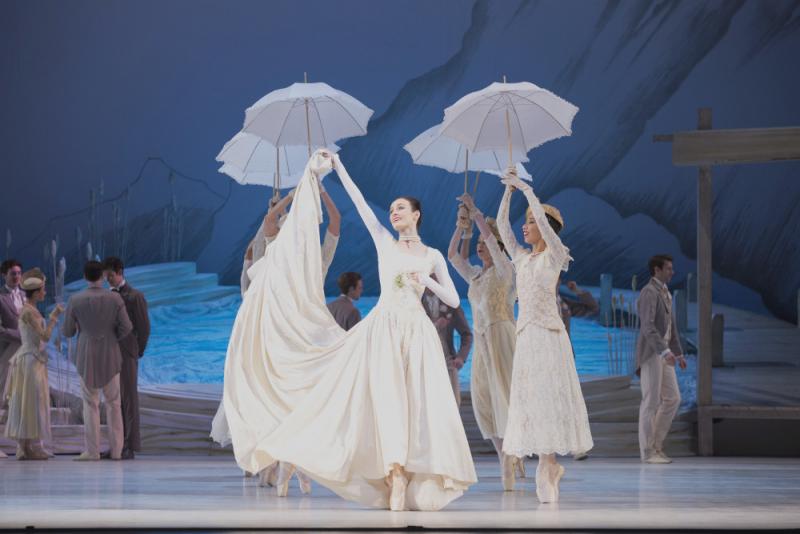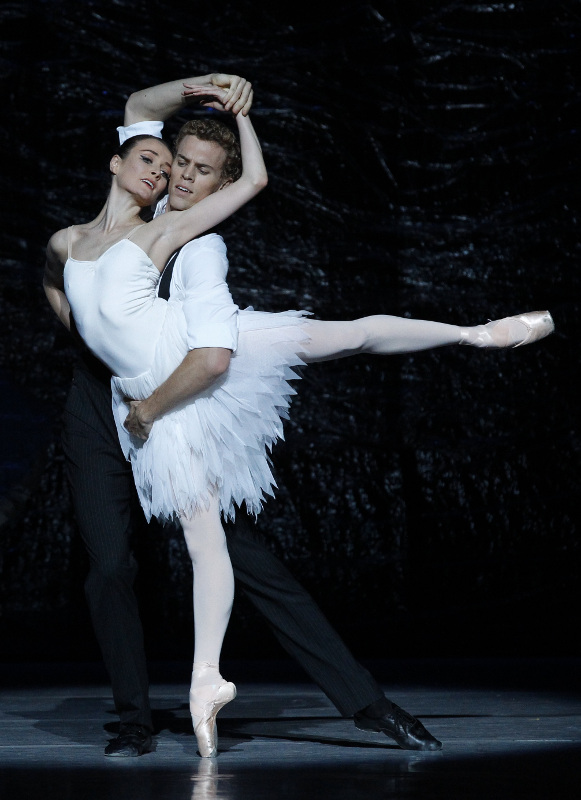Swan Lake, Australian Ballet, London Coliseum | reviews, news & interviews
Swan Lake, Australian Ballet, London Coliseum
Swan Lake, Australian Ballet, London Coliseum
Visiting Aussies are engaging in lush production, but the plot's not all that

Graeme Murphy's 2002 Swan Lake for Australian Ballet stitches together plot elements from Swan Lake, Giselle and Lucia di Lammermoor, among other things. No bad thing, that; such mash-ups can work well (see Moulin Rouge), and Matthew Bourne proved way back in 1995 that Swan Lake's story can be totally reconfigured and still work gloriously (we do not talk about the 2011 film Black Swan).
Despite having got to the theatre too late to read the synopsis, I could easily follow the story of the Prince who marries one fragile young woman, of whom his mother disapproves, but is secretly having hot sex with an older, married courtier. I mean, to be fair it's not an unfamiliar scenario (the facial resemblance of the Queen, played by Shane Carroll, to senior women of the House of Windsor drives it home for those with short memories) but it's executed with verve by the cast.
The Baroness proves to be a useless substitute for a real villain
Amber Scott of the delicate arms plays Odette with an ingratiating girlishness à la Marianela Nuñez overlaid with a Kristin Scott Thomas-alike pale brittleness, and the chemistry between Prince Siegfried (Adam Bull) and his lover Baroness von Rothbart (Dimity Azoury) is undeniable, both during the wedding party scene and in the rather startling full-on sexual encounter that takes place during the Prologue, all of about two minutes after curtain up. The whole Act I party scene thrums with carefully choreographed but naturalistically acted interactions, so that though the choreography is workaday rather than inspired, there is still plenty to rivet your attention on the stage, which ripples with more clandestine currents of emotion than a Downton Abbey dinner party. 
In its tame prettiness and plot pointlessness, this dream sequence is offensive to people with mental illness, to actual swans (flipping scary birds), to Ivanov's original choreography, and to the conventions of tragic drama. And Act III only supplies more of the same, as Odette returns from the loony bin, reconquers the Prince with her innocence, and then goes mad again and rushes off to die in the wilderness (cf Manon). The Baroness proves to be a useless substitute for a real villain; I kept hoping she was about to rush off, come back with a gun and shoot the pair of them, but instead she just goes all wobbly and sad when the Prince's change of heart becomes clear. Even poor Odette doesn't get to expire with any drama, but fades away, only bobbing up briefly to wave from the black pool which does service as a lake, but is in fact – the cerebellum-like white disc at the end suggests – actually just the empty inside of her skull.
It's a huge come-down from the excitement and tension of Act I, and doesn't do justice to what I suspect are the company's, and the choreographer's, considerable talents: there is plenty of heartfelt acting and characterful dancing to be seen, and Murphy's skill in inventive balletic narration puts him above many choreographers working today. But re-write a fairy tale plot at your peril: yes, Swan Lake can be psychologized if that's your bag, but without either evil (as in the original plot) or real terror (the psychodrama equivalent) this is just a depressing story about a man who can't make his mind up and two women too spineless to ditch him.
I record that it is lushly designed and lit, that the orchestra of English National Opera sound fabulous under the baton of Australian Ballet's conductor, Nicolette Faillon, that the reordered score is surprisingly slick and coherent, that the dancers are committed and likeable. Those who can ignore the plot holes will have a fine, fun evening at the ballet, as indeed last night's enthuasiastic audience appeared to do.
- The Australian Ballet perform Swan Lake at the London Coliseum until 16 July and Alexei Ratmansky's Cinderella 20-23 July. Three of the company's fairy tale ballets will be broadcast live to cinemas worldwide, including in the UK, in October 2016.
- Read more dance reviews on theartsdesk
rating
Explore topics
Share this article
The future of Arts Journalism
You can stop theartsdesk.com closing!
We urgently need financing to survive. Our fundraising drive has thus far raised £49,000 but we need to reach £100,000 or we will be forced to close. Please contribute here: https://gofund.me/c3f6033d
And if you can forward this information to anyone who might assist, we’d be grateful.

Subscribe to theartsdesk.com
Thank you for continuing to read our work on theartsdesk.com. For unlimited access to every article in its entirety, including our archive of more than 15,000 pieces, we're asking for £5 per month or £40 per year. We feel it's a very good deal, and hope you do too.
To take a subscription now simply click here.
And if you're looking for that extra gift for a friend or family member, why not treat them to a theartsdesk.com gift subscription?
more Dance
 'We are bowled over!' Thank you for your messages of love and support
Much-appreciated words of commendation from readers and the cultural community
'We are bowled over!' Thank you for your messages of love and support
Much-appreciated words of commendation from readers and the cultural community
 iD-Reloaded, Cirque Éloize, Marlowe Theatre, Canterbury review - attitude, energy and invention
A riotous blend of urban dance music, hip hop and contemporary circus
iD-Reloaded, Cirque Éloize, Marlowe Theatre, Canterbury review - attitude, energy and invention
A riotous blend of urban dance music, hip hop and contemporary circus
 How to be a Dancer in 72,000 Easy Lessons, Teaċ Daṁsa review - a riveting account of a life in dance
Michael Keegan-Dolan's unique hybrid of physical theatre and comic monologue
How to be a Dancer in 72,000 Easy Lessons, Teaċ Daṁsa review - a riveting account of a life in dance
Michael Keegan-Dolan's unique hybrid of physical theatre and comic monologue
 A Single Man, Linbury Theatre review - an anatomy of melancholy, with breaks in the clouds
Ed Watson and Jonathan Goddard are extraordinary in Jonathan Watkins' dance theatre adaptation of Isherwood's novel
A Single Man, Linbury Theatre review - an anatomy of melancholy, with breaks in the clouds
Ed Watson and Jonathan Goddard are extraordinary in Jonathan Watkins' dance theatre adaptation of Isherwood's novel
 Peaky Blinders: The Redemption of Thomas Shelby, Rambert, Sadler's Wells review - exciting dancing, if you can see it
Six TV series reduced to 100 minutes' dance time doesn't quite compute
Peaky Blinders: The Redemption of Thomas Shelby, Rambert, Sadler's Wells review - exciting dancing, if you can see it
Six TV series reduced to 100 minutes' dance time doesn't quite compute
 Giselle, National Ballet of Japan review - return of a classic, refreshed and impeccably danced
First visit by Miyako Yoshida's company leaves you wanting more
Giselle, National Ballet of Japan review - return of a classic, refreshed and impeccably danced
First visit by Miyako Yoshida's company leaves you wanting more
 Quadrophenia, Sadler's Wells review - missed opportunity to give new stage life to a Who classic
The brilliant cast need a tighter score and a stronger narrative
Quadrophenia, Sadler's Wells review - missed opportunity to give new stage life to a Who classic
The brilliant cast need a tighter score and a stronger narrative
 The Midnight Bell, Sadler's Wells review - a first reprise for one of Matthew Bourne's most compelling shows to date
The after-hours lives of the sad and lonely are drawn with compassion, originality and skill
The Midnight Bell, Sadler's Wells review - a first reprise for one of Matthew Bourne's most compelling shows to date
The after-hours lives of the sad and lonely are drawn with compassion, originality and skill
 Ballet to Broadway: Wheeldon Works, Royal Ballet review - the impressive range and reach of Christopher Wheeldon's craft
The title says it: as dancemaker, as creative magnet, the man clearly works his socks off
Ballet to Broadway: Wheeldon Works, Royal Ballet review - the impressive range and reach of Christopher Wheeldon's craft
The title says it: as dancemaker, as creative magnet, the man clearly works his socks off
 The Forsythe Programme, English National Ballet review - brains, beauty and bravura
Once again the veteran choreographer and maverick William Forsythe raises ENB's game
The Forsythe Programme, English National Ballet review - brains, beauty and bravura
Once again the veteran choreographer and maverick William Forsythe raises ENB's game
 Sad Book, Hackney Empire review - What we feel, what we show, and the many ways we deal with sadness
A book about navigating grief feeds into unusual and compelling dance theatre
Sad Book, Hackney Empire review - What we feel, what we show, and the many ways we deal with sadness
A book about navigating grief feeds into unusual and compelling dance theatre
 Balanchine: Three Signature Works, Royal Ballet review - exuberant, joyful, exhilarating
A triumphant triple bill
Balanchine: Three Signature Works, Royal Ballet review - exuberant, joyful, exhilarating
A triumphant triple bill

Add comment